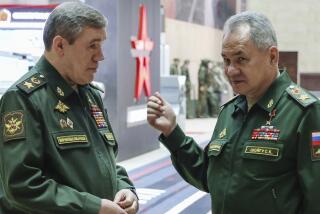Russian Prosecutor Charges Zhirinovsky as Warmonger
- Share via
MOSCOW — Russia’s top prosecutor brought criminal charges of warmongering Wednesday against ultranationalist Vladimir V. Zhirinovsky, who advocates Russian military expansion and has made menacing statements against Japan and Germany.
The case opened by Russia’s prosecutor general is the most serious legal challenge yet to Zhirinovsky, whose unlimited promises and jingoist Great Russia stance made his party the biggest vote-getter in December parliamentary elections.
Zhirinovsky denied that he knew of the charges and attributed claims that he preached war to the “sick imagination” of his enemies.
He told reporters at a joint news conference with visiting German right-winger Gerhard Frey that the book on which the charges are partly based, a combination autobiography and political treatise, “will soon be on the curriculum of all Russian universities.”
Zhirinovsky, in such an ebullient mood that he repeatedly hugged and kissed Frey for the cameras, did not back down from former statements about creating a new Hiroshima in Japan and a new Chernobyl in Germany. He said he wanted to warn the world that it will indeed face World War III if “the humiliation of Russia doesn’t cease.”
The prosecutor’s charges are based on an article in the Russian Criminal Code that forbids the propagation of war. Those convicted under Article 71 face three to eight years in prison.
As a deputy in the Russian Parliament, Zhirinovsky is immune to arrest, but Prosecutor General Alexei Kazannik still has the right to open a case against him, according to the Itar-Tass news agency, which reported the charges. Eventually, however, prosecutors will have to ask lawmakers to remove Zhirinovsky’s immunity if they want to send him to jail.
The charges pending against Zhirinovsky raise the question of whether authorities will allow him to leave the country on an impending trip planned to include the Yugoslav capital, Belgrade, and Warsaw. In the long term, they could also conceivably block his run for the presidency in 1996, if he is in prison at the time.
Zhirinovsky allows that his book, “The Last Dash South,” envisions Russian troops marching across Asia to the Indian Ocean. But he contends that in the scenario, the troubled countries of the south would have pleaded for the troops to intervene and bring order.
In another scenario Zhirinovsky described Wednesday, Russian President Boris N. Yeltsin would give up on the new Cabinet he has now put together and come to Zhirinovsky by next autumn to ask him to form a new government. Zhirinovsky said he would be prepared to serve as prime minister or head of the Foreign, Interior, Security or Defense ministry.
Meanwhile, the post-election Cabinet appeared to be nearly complete. After extended vacillation over Boris G. Fyodorov, the reformist finance minister who fought to keep a cap on inflation, Yeltsin appeared to give up on him Wednesday.
Fyodorov had insisted that if Yeltsin wanted him to stay, the president would have to dump the head of the Russian Central Bank and the Communist agriculture minister. Instead, the Interfax news agency reported, Yeltsin let Fyodorov go and appointed the deputy finance minister to take his place.
The deputy, Sergei Dubinin, appeared to be a compromise candidate. Fyodorov told Interfax that Dubinin best fits the post now because he “won’t allow the collapse of the ministry’s apparatus and will continue the former course.”
Since Yegor T. Gaidar, the main designer of Russia’s last two years of economic reform, quit Jan. 16, concern has mounted among Russian reformers and Western governments that the Kremlin will revert to its old ways.
“Boris Nikolayevich, the country has had an economic coup, a turn back,” Fyodorov told Yeltsin in a letter carried by Itar-Tass. “Our only hope is you!”
He called the new Cabinet “red managers,” meaning that they want to run the economy by issuing commands, fixing prices and mandating supplies in the old Communist style.
Fyodorov and Gaidar have warned that conservative Prime Minister Viktor S. Chernomyrdin will send inflation rocketing by increasing subsidies to failing industries and farms.
Chernomyrdin, in his defense, has maintained that the Russian government will not deviate from its basic reform program, but he has said that the time has come to concentrate more on halting the sharp drop in Russia’s production. His views appeared to gain more weight with Yeltsin in the wake of the Dec. 12 elections, in which the strong support for Zhirinovsky came across as a protest vote by a population feeling the pain of reform.
But the Gaidar camp warns that if the government tries to cushion the impact of reform through heavy spending, Russia will end up like Ukraine, so deep in crisis the economy appears barely functional.
More to Read
Sign up for Essential California
The most important California stories and recommendations in your inbox every morning.
You may occasionally receive promotional content from the Los Angeles Times.













